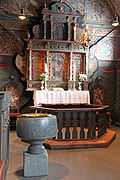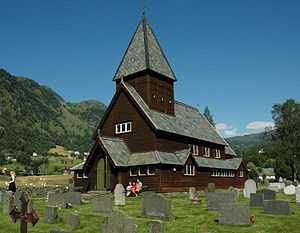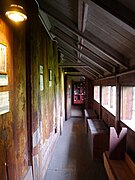Røldal Stave Church
| Røldal Stave Church | |
|---|---|
| Røldal stavkyrkje | |
|
View of the church | |
 Røldal Stave Church Location in Hordaland county | |
| 59°49′51″N 6°49′22″E / 59.8308°N 6.8227°ECoordinates: 59°49′51″N 6°49′22″E / 59.8308°N 6.8227°E | |
| Location | Odda, Hordaland |
| Country | Norway |
| Denomination | Church of Norway |
| Churchmanship | Evangelical Lutheran |
| Architecture | |
| Status | Parish church |
| Functional status | Active |
| Architect(s) | Unknown |
| Completed | c. 1250 |
| Specifications | |
| Capacity | 130 |
| Materials | Wood |
| Administration | |
| Parish | Røldal |
| Deanery | Hardanger og Voss prosti |
| Diocese | Diocese of Bjørgvin |
| Røldal Stave Church | |
|---|---|
| Type | Church |
| Status | Automatically protected |
| County | Hordaland |
| Municipality | Odda |
| Year built | 13th century |
| ID | 85335 |
Røldal Stave Church (Norwegian: Røldal stavkyrkje) is a stave church in Odda municipality in Hordaland county, Norway. It is located in the village of Røldal. The church is part of the Røldal parish in the Hardanger og Voss deanery in the Diocese of Bjørgvin. The church is a preserved historic museum, but it is still a regularly-used parish church that holds regularly scheduled worship services twice a month.[1][2][3]
History
The estimated age of the Church is generally dated to between 1200-1250. A baptismal font in the church is dated to between 1200 and 1250. A crucifix in the church dates from about 1250. The altarpiece by German painter Gottfried Hendtzchell from Wroclaw in Silesia dates to 1629.
The Church has a rectangular-shaped nave and chancel. The baptismal font is of soapstone and dated 1200-1300 century. The Bergen Museum holds a variety of building components and other artifacts from the medieval church. These include altar frontal and wooden sculptures of St. Olaf from about 1250, of the Virgin Mary with child from about 1250, and the Archangel Michael, dated about 1200. In the Middle Ages, Røldal Church received large donations from many of pilgrims who flocked to the church. As a result, the small village where the church is located, became quite prosperous. In the 17th century the walls inside the church were richly decorated with paintings.[4]
During reconstruction of the church in 1844, some of the history of the church was uncovered. This led to an investigation to determine how the church was built. The resulting belief is that Røldal Stave Church was quite different from other stave churches. Some controversy developed about whether this is in fact a stave church or rather an example of the assumed predecessor type, a post church.
During the period 1913-1918, the church underwent an extensive church renovation and restoration. Paneling from the 19th century were removed and Renaissance interior restored. A new gallery around the church was also built to protect the wall tables. The church reconstruction was led by Norwegian architect Jens Zetlitz Monrad Kielland (1866–1926), while the color restoration was performed by Norwegian painter Domenico Juul Erdmann (1879–1940), who was assisted by Norwegian painter Alfred Obert Hagn (1882–1958), and Danish-Norwegian artist Adolph Ulrik Hendriksen (1891–1960).[3][5][6]
Gallery
-
View of the church and graveyard
-
Rear view of the church
-

Altar in Røldal church
-
Front interior view of the church
-
Back interior view of the church
-
Interior ceiling of the church
-

Statue of St Olav
-

Statue of Madonna and child
-

Statue of Archangel Michael
-
Side arcade of the church
References
- ↑ "Røldal stavkyrkje". Kirkesøk: Kirkebyggdatabasen. Retrieved 2014-06-06.
- ↑ "Oversikt over Nåværende Kirker" (in Norwegian). KirkeKonsulenten.no. Retrieved 2014-06-06.
- ↑ 3.0 3.1 Store norske leksikon. "Røldal stavkirke" (in Norwegian). Retrieved 2014-06-06.
- ↑ "Røldal stave church" (in Norwegian). Stavkirke.info. Retrieved 2014-06-06.
- ↑ Store norske leksikon. "Domenico Juul Erdmann" (in Norwegian). Retrieved 2014-06-06.
- ↑ Jensenius, Jørgen H. (1998). "Røldal, Stavkirke Eller...?". Viking LXI: 131–145.
Other sources
| Wikimedia Commons has media related to Røldal stavkirke. |
- Bugge, Gunnar (1983). Stavkirker. Oslo: Dreyers Forlag. ISBN 82-504-2072-1.
- Hagn, Alfred (1916). Skildrerier. Kristiania.
- Rønningen, G (1990). Kirketårn og takryttere fra 1621 til 1802 i Hamar. Oslo: University of Oslo.
External links
| ||||||||||||||||||






